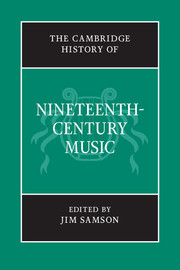Book contents
- Frontmatter
- Part One 1800–1850
- 1 The musical work and nineteenth-century history
- 2 Music And the rise of aesthetics
- 3 The profession of music
- 4 The opera industry
- 5 The construction of Beethoven
- 6 Music and the poetic
- 7 The invention of tradition
- 8 Choral music
- 9 The consumption of music
- 10 The great composer
- Part Two 1850–1900
- Chronology
- Institutions
- Personalia
- Index
- References
4 - The opera industry
from Part One - 1800–1850
Published online by Cambridge University Press: 28 March 2008
- Frontmatter
- Part One 1800–1850
- 1 The musical work and nineteenth-century history
- 2 Music And the rise of aesthetics
- 3 The profession of music
- 4 The opera industry
- 5 The construction of Beethoven
- 6 Music and the poetic
- 7 The invention of tradition
- 8 Choral music
- 9 The consumption of music
- 10 The great composer
- Part Two 1850–1900
- Chronology
- Institutions
- Personalia
- Index
- References
Summary
Introduction
Even with endorsement from a figure as eminent as the great Italian politician Cavour, who called opera ‘a great industry with ramifications all over the world’, the title of this chapter accepts a number of prejudices. Why should opera of this period be thought an ‘industry’ when, say, orchestral music or secular choral music is not? All these types of public entertainment were fostered by institutions in which were embedded power relations and social hierarchies; all had systems of production limited by economic circumstance; all depended on the agency of performers, and so forth. But opera, and perhaps particularly opera of this period, seems historiographically more deeply marked by its means of production than other musical genres; the mechanics of how operas come into being are thus more difficult to disentangle from the ‘works themselves’. What is more, this circumstance is often used as a means of devaluing the repertory, questioning its seriousness of purpose as ‘art’. To repeat the question, why is this?
The simplest explanation lies in a marked shift in opera’s aesthetic status. The very idea of ‘opera’ underwent an important transformation during the eighteenth century, evolving from a sub-species of spoken theatre into what was essentially a musical genre. And even though elements of the earlier definition remained in force in some areas during the early decades of the nineteenth century (perhaps particularly in the otherwise very different cases of Italian opera seria and French opéra comique), the period covered by this chapter saw a gradual consolidation of this new status, with music regarded more and more as the dominant element, and with the position of the librettist as a literary/dramatic figure experiencing sharp decline.
- Type
- Chapter
- Information
- The Cambridge History of Nineteenth-Century Music , pp. 87 - 117Publisher: Cambridge University PressPrint publication year: 2001
References
- 3
- Cited by

